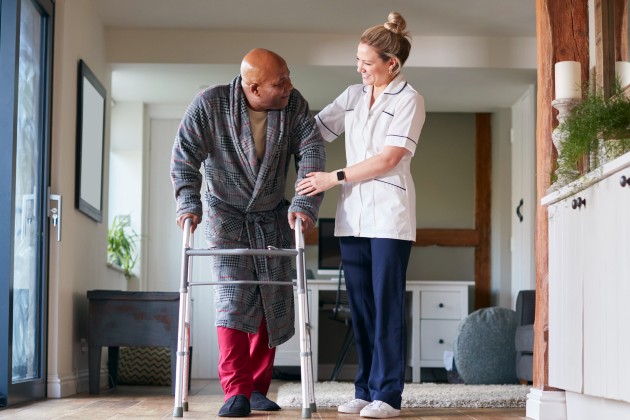Could you be a nurse prescriber?
Samantha says the qualification has expanded her knowledge and made her a better practitioner
The RCN recommends using an updated browser such as or
White nurses are twice as likely to be promoted than Black and Asian staff. Ruby’s proactively tackling the issue. Here’s her story

‘I’m a person of colour with a passion and vision for equality,” says Ruby Lopez. “In my trust, more than 40% of band 5 nurses are from a Black or minority ethnic background, yet these staff are significantly under-represented in the most senior roles. This can’t be ignored.”
It’s an issue felt by many nursing staff. Earlier this year, shocking results from a UK-wide RCN employment survey found White nurses are twice as likely to get promoted than Black and Asian staff.
Across the NHS, it’s a similar picture. NHS Workforce Race Equality Standard (WRES) data has shown a steady and disproportionate increase in the number of staff from minority ethnic backgrounds not getting promotions, not being able to access non-mandatory training, not getting shortlisted or being successful in interviews.
Ruby’s helping to make changes. At Cambridge University Hospitals Trust, where she works, she’s determined to transform the career prospects of minority ethnic nursing staff.
I wanted to help staff focus on how to overcome challenges as a person from a different background
As a first step, Ruby, who’s ÃÏ√¿¥´√Ω learning rep and cultural ambassador, organised a career development webinar, with support from trust leaders, the Equality Diversity and Inclusion Team, senior nurses and the hospital’s Black and Minority Ethnic Network. The webinar set out to provide practical information for staff in her division.
“I had to make staff aware of the development opportunities already being offered and signpost them to other career resources,” Ruby says. “People have since told me they had no idea these things existed. Our staff are busy, tired and stressed, they just hadn’t had time to look.”
Ruby was also keen to build confidence.
“I wanted to help staff focus on how to overcome challenges as a person from a different background. We included a session on the lived experiences of two staff who are working in senior roles at bands 7 and 8b. What they said was powerful and really hit home. They’d faced challenges getting where they are now, but they inspired those attending to pursue what they previously perceived as impossible in terms of career progression and development.”
The webinar covered other issues, including inequality and inequity of access and opportunity, capacity and staffing challenges, funding constraints, practical advice on appraisals, networking, mentoring, interviews and completing applications.
Just a few weeks after the webinar, after seeking support for application writing and interview prep, several staff have been promoted and one has secured a place on an advanced practitioner course.
Following the success of one session, Ruby’s now rolling out the event across the trust. “This is only one project, one step towards opening many opportunities for our staff from minority ethnic backgrounds. I’m confident that with the support of trust leaders, this can be transformative.”
Ruby approaches her mission with lived experience, after spending 18 years in the trust and getting her band 7 role as a senior sister five years ago.
You know what you need to do so be vocal about it
Now, she’s contemplative: “Continuing professional development isn’t just about sitting in a classroom. It’s about reflecting on situations, and using them as a learning tool,” Ruby says.
“I tell people to be confident. You can attain your goals, but you need perseverance, hard work, motivation and an awareness of what you want from your career. You know what you need to do so be vocal about it. The initiative must come from you.”
Employers are responsible for creating equality of access to CPD for staff, and for opportunity to explore career progression. Read more in the.
Applications are open for a new programme of education grants to support minority ethnic nursing and midwifery staff to undertake training and develop their skills.
The RCN Foundation Olufunke Adeyeye education grant has been made possible thanks to the generosity of Olufunke’s family. She was a life-long nurse and midwife, with a varied career spanning more than 50 years, who died in 2020.
Her family say: "Olafunke was a single parent who believed that anyone fortunate enough to have a good education and career can dare to aspire and over-achieve, despite life’s challenges.
"In her character she was a true nurse – she would never ignore an opportunity to care for and support anyone in need."

Samantha says the qualification has expanded her knowledge and made her a better practitioner

Historian Dr Erin Spinney uncovers the lives and work of enslaved Black nurses

How the RCN is helping displaced people explore health care careers

Find out about a consultation on new draft profiles


How the scheme introduces young people to nursing
{{ article.Summary }}